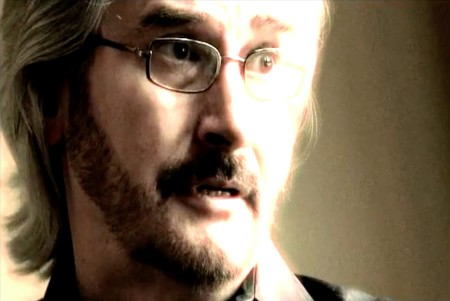I write this on Ash Wednesday, the beginning of the season of Lent in the Church. These 40 days are popularly characterized by “giving something up” for Lent. Eight years ago, and reposted every year since, I criticized Christians who “give up social media for Lent.” I was wrong. Here’s why.
The Theory: Missionaries to a Digital Culture
Dr. Leonard Sweet (@lensweet) is a church futurist who has many evocative books about Christianity and our changing culture. In a video of him that I have archived from The Work of The People (not available anymore, sorry), Sweet talks about social media as a mission field.
Good luck with saying in the past 500 years “I’m sorry, I don’t do books.” Good luck with saying in the next 30 years, “I’m sorry I don’t do Internet.” As the book was the delivery system for learning and faith development, the Internet will be the delivery system for learning and faith development…
What’s the first thing a missionary does? Learn the language. This is the language of the world we live. I’m sorry if you don’t like it. You could go “okay, I don’t like Swahili.” Well, if God has called us to be ministry now in this kind of a world, so you don’t get to choose: you have to learn a new language.
For Sweet, the Internet is not an endeavor or an add-on or a “it would be nice if we participated in it” but it is an essential aspect of outreach to large swaths of humanity. Millennials and younger folks (and even early adopter Gen-Xers like this geek blogger) have grown up as the Internet Generation. This is the mission field that a super-majority of them are in.
I find Sweet’s claim convicting because online interactions are a different form of communication. There’s often nothing to give context or weight other than pixels on a screen, so it takes intentionality with language and building up of cadences that others will recognize as “that sounds like Jeremy.” And it has taken a lot of trial and error to communicate across generations in a holistic way, especially during the pandemic when so many places of physical conversations were shut down.
Internet communications are a language that we must learn if we want the church to be missionally effective in the future. But does that mean we have to always be present in that world? Or can we take breaks from it?

The Question: Why Give up the Mission Field??
It is seeing “online interaction as a mission field” that caused me for years to question why people–including many pastors–give up social media for Lent?
I admit, the most annoying aspect of this phenomenon is the updates of “Hello, I’m giving up social media for Lent.” This is ironic considering the lectionary text for Ash Wednesday is Matthew 6 where Jesus calls out people who…do their penance in public and make sure everyone knows of their sacrifices. As a friend on Facebook said:
“And when you give up social media for 40 days, be sure to announce it to the whole world. And God who sees what you do in public will reward you in public!” (pretty sure JC said this!)
(Mis-translation, to be sure!)
But more to the point, giving up social media for Lent means that–for 40 days–there are fewer voices of faith online to offer moments of helpful interaction and allow Christ into the cracks of the social media facades we create. Especially in this season of voices that have already left social networks with problematic billionaire owners (ie. Twitter), which leaves fewer voices of faith in this mission field.
Leonard Sweet closes his video with a reminder. I don’t share his anthropomorphic understanding of evil (ie. The Devil), but it’s a helpful image in this case to remind us that when we cede the field, it gets filled immediately.
The Devil is an evangelist. The Devil is learning their language. The Devil is learning how to speak on the Internet real well. So, are we going to leave him with the field? Or are we going to get in there in the struggle of good and evil.

A Better Answer: Self-Care for the sake of the Mission
For years, I ridiculed Christians who would leave social media, both for missional reasons above…and honestly from my own extrovert insecurity of “great, now I’m alone here.”
But the pandemic and walking alongside the self-care of fellow church workers have taught me to listen better than speak.
- Like Jesus who needed to get away from the crowds to recharge, there’s a place for stepping away from the crowd to recharge.
- I had a friend in seminary who was seriously burned by having her personal life online and she stepped away for several years from social media, and has now returned better than before.
- Author Meredith Gould in The Social Media Gospel includes a section on burnout.
- There are plenty of addiction studies and intentional harm by social media algorithm studies.
A commenter to the original post rightly undermined my original claim by taking the metaphor literally:
God has built into our very bodies the need for rest and Sabbath. Indeed, a minister who works 24/7 will soon burn out. Even missionaries speaking Swahili take a day off, or return home to visit friends or take a vacation with their family.
(Scott)
So I better understand the desire to disconnect comes from a place of self-care. I lament the reduction of voices of faith online during a season of 40 long days, but if a social media fast leads to better, healthier voices the other 325 days of the year, then it’s a fast to choose indeed. I’m sorry for my years of negativity towards a practice that has real and virtual world benefits.

Tips for balancing self-care with missional considerations
The mission field remains, and to those who wish to balance self-care while remaining connected to the mission field online, here are three suggestions:
- Fast from social media from sunup to sundown. Don’t give up social media, but give up the way you use social media. I have the apps on my phone and I get the notifications as they come in. I go through periods where I turn off those notifications and only interact at particular times. So like Muslims who fast from sun-up to sun-down during Ramadan, maybe only interact at particular times when you know you can handle it, or one day a week.
- Interact in a different way. Perhaps choose to send emails or call people on the phone when you see they are doing something online that you wish to interact with. Choosing a new form of communication maintains the engagement but moves it into an arena where you might feel more comfortable.
- Redirect to other missionaries in the field. If you do sign off entirely, perhaps send your followers to other practitioners in your field. If you primarily interact online as a church pastor, redirect to your church social media account so they can see your church writings and videos. If you are an advocate, post something like “follow @umjeremy for any United Methodist updates during Lent.” That way, your people can follow trusted folks in your absence.
Other suggestions? Post them in the comments – if you haven’t given up blogs already! 🙂
I’m still learning that self-care takes many forms. May we all care for one another in this season so that we can celebrate Easter together, and call our mission fields online and offline to that celebration of hope.
Your Turn
Thoughts?
Thanks for reading, commenting, subscribing, and sharing on social media.



I had to stop by to check out the promised post. And also, blogs are all I have now without Facebook and Instagram! 😉 (Wow, I have tried to navigate to my currently nonexistent FB app waaaay too many times today, so I guess a break was needed!) Thanks for giving this reconsideration! One of the things I’ve been thinking about it how good a job platforms like FB do at making sure leaving for any reason is very difficult. I *have* to use FB still for my Drew work. I can use the Meta for Business platform, but I can’t disentangle entirely because there aren’t other effective ways right now to reach the student body with information about campus worship life. Another lament, not on my current problem list, but when I was in pastoral ministry – when I would go on vacation, messenger doesn’t have any auto responder feature. So I would have parishioners messaging me instead of emailing me (where I did have my vacation message up), and I’d have to at least answer them to say I wasn’t answering them…which defeats the purpose. Anyway, trying to keep a list for myself of what’s driving me every time I want to open the deleted app. Sometimes, a desire for community. But often not…
And also: “I admit, the most annoying aspect of this phenomenon is the updates of “Hello, I’m giving up social media for Lent.”
… Look, I’m experiencing spiritual growth already (and telling you about it), because I’m not even focusing on this section of your blog 😉
One year for Lent, I opted to not go on Facebook until I’d read the Bible for the day and set a daily time limit with my scrolling. It felt like a balanced way to approach it.
Other times I found ways to limit my Facebook engagement to messages and groups. (Note: This was nearly 10 years ago and I tend to be more of an observer than a poster on social media. But maybe someone will find this useful. )